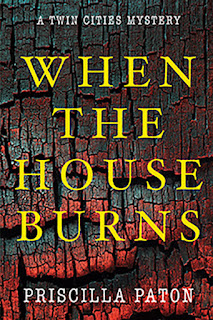Priscilla Paton is the author of the new mystery novel When the House Burns, the third in her Twin Cities mystery series. She lives in Northfield, Minnesota.
Q: This is your third Twin Cities mystery--did you know when you were working on the first one that you’d be writing a series?
A: Heck no. I’d done academic writing and a children’s book, but 85,000 words that were totally made up? I considered myself lucky to finish one mystery, and at the time it was too anxiety-provoking to think about what might follow.
That said, I was inspired by series: P.D. James with Adam Dalgliesh and Kate Miskin; Rex Stout with Nero Wolfe and Archie Goodwin; Elizabeth George with Inspector Lynley and Barbara Havers. (Investigators, like academics, are analytical thinkers caught up in personal issues.)
When the acquisition editor at Coffeetown Press asked if my first, Where Privacy Dies, began a series, I said, “of course!”
Q: What inspired the plot of When the House Burns?
A: The plot involves housing, displacement, and arson. Initially I had a different plot in mind, but then came the Covid pandemic shutdown. During that time, I had to move out of a house with a toxic basement, young relatives were outbid on housing offers, evictions were in the news, and a realtor was murdered in the Twin Cities.
These elements jumbled together in my brain, but I couldn’t do in-person interviews or site research. I struggled to outline the story. Fortunately, the Twin Cities Sisters in Crime chapter hosted Zoom presentations that included a social worker who aided the homeless and an arson investigator.
Doing online research, I came across an unusual take on arson in the Harvard Business Review which provided a plot twist—to say more would be a spoiler.
Q: How would you describe the relationship between your detective characters Erik Jansson and Deb Metzger, and do you think the two of them have changed over the course of the series?
A: A game of ping-pong, a match where one plays checkers and the other chess, a yin-yang symbiosis where it’s unclear who’s yinging and yanging. Both are in their 30s, athletic, and attracted to women.
Sly Erik and outspoken Deb test each other, an ongoing tension, and that testing could undermine their odd rapport instead of leading to new insights. However, they do become more aware of how to use each other’s strengths, and mutual frustration more often becomes mutual empathy.
Q: The writer Susanna Calkins said of the book, “Full of rich details evoking the Twin Cities culture and ambience, this well-crafted mystery offers nuanced characters and an unexpected plot.” What do you think of that description, and how important is setting to you in your writing?
A: I grew up on a Maine dairy farm, and when you come from a setting like that, it shapes you and you absorb its character. My academic work focused on writers like Robert Frost who depicted the New England landscape.
I’ve lived for nearly two decades in Minnesota (my husband is a Midwesterner) which also has a distinctive flavor with its infamous winters, its lakes, the headwaters of the Mississippi River, and plenty of urban parks and wetlands for hiding bodies.
The opening scene of my first mystery, Where Privacy Dies, came to me when I was birdwatching in a backwater near the MSP airport.
After the pandemic shutdown lifted, I visited places for When the House Burns: a corn maze, an amazing Indian restaurant, the outskirts of an EPA cleanup site where an ammunition plant had been, a construction zone, and the memorial in Minneapolis to survivors of domestic violence.
Q: What are you working on now?
A: I started a stand-alone mystery about a divided family where the poorer relations split away from the rich ones, a split which further disadvantages them. When the rich patriarch is murdered, it seems they’ll inherit nothing; yet they’re suspects, and good intentions turn disastrous. However, my detectives keep butting in with their joie-de-crime. If there’s a murder, they want in on it.
Q: Anything else we should know?
A: Writing fiction helps me confront painful topics and lets me have fun.
--Interview with Deborah Kalb


No comments:
Post a Comment